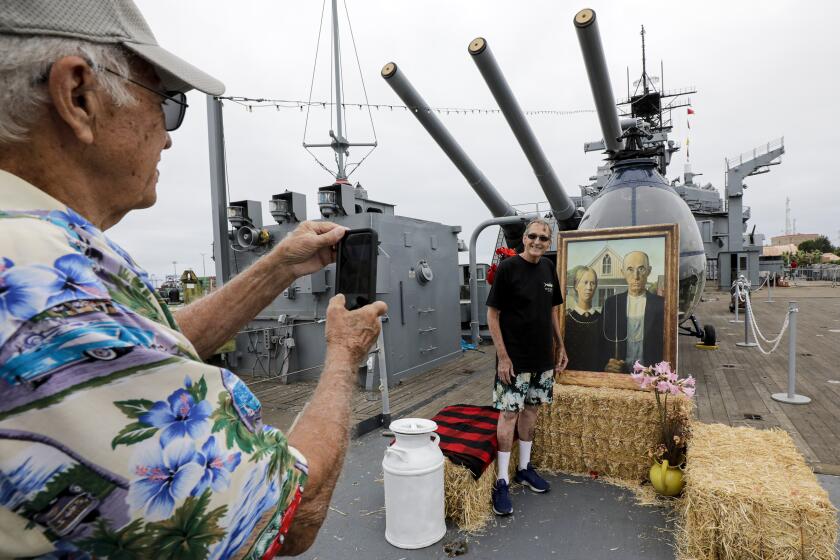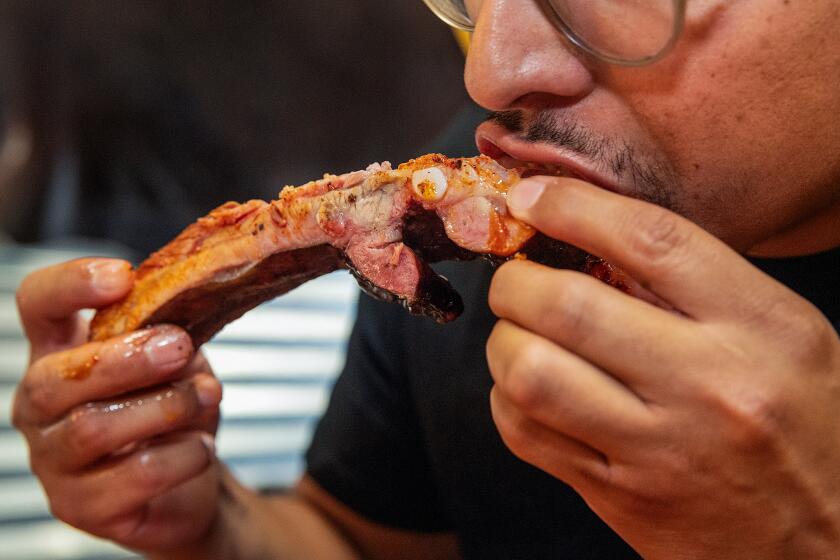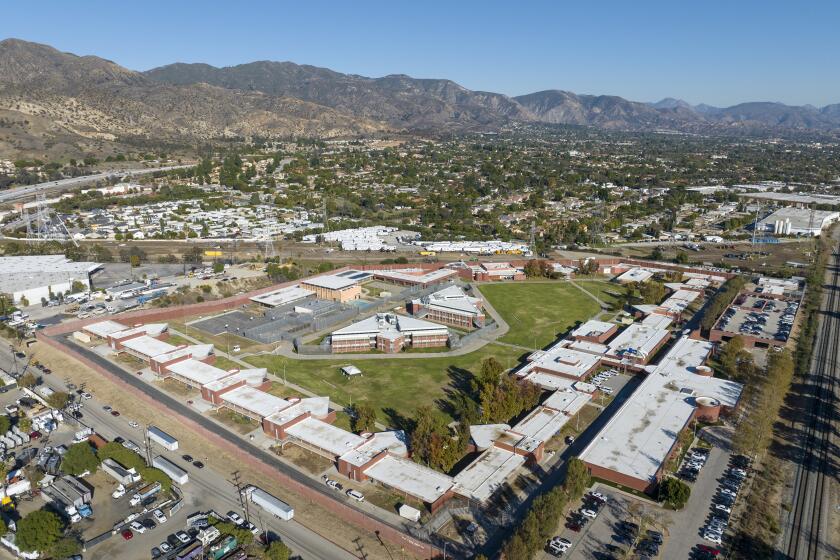How I found out California and Iowa are linked by pigs. And the NFL
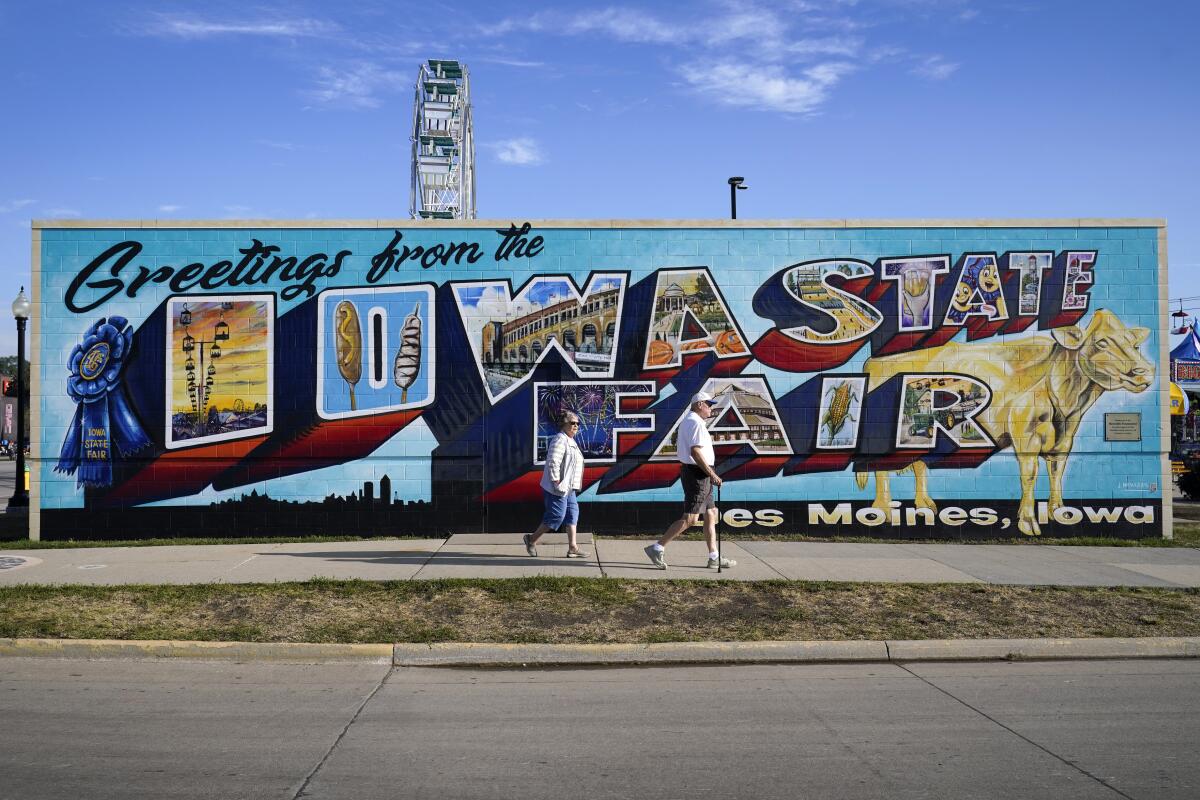
- Share via
If someone had told me that my summer vacation would be in Iowa, I would’ve laughed.
I don’t really take time off for fun — no rest for the weary when you want to be the next Steve Lopez, you know?
And even if I did take vacations … Iowa?
I have nothing against the Hawkeye State, mainly because it’s meant next-to-nothing to me. I know it’s in the Midwest, that it’s swarming with Republican presidential hopefuls and that a bunch of Iowans moved to Southern California generations ago and have held picnics to celebrate their Iowa-ness for 123 years.
Oh, there’s also “American Gothic.” Native son Dan Gable, a college wrestling legend. And the time a friend of mine declined a tenure-track position at Grinnell College because the state was so darn white.
The Iowa Picnic, an 119-year-old Long Beach institution, finds new blood to keep it going
She’s about the only person I know with any connection to Iowa. So when I told my friends and family I had received an invitation to a hog farmers’ convention in Des Moines, the snickers were louder than the Tilt-A-Whirl at the recently concluded Iowa State Fair. Why would I want to hang out with people who, in their minds, would undoubtedly be white, racist and Republican?
Even my gringo compadre, who graduated from Luther College in Decorah, laughed, when I said I would be spending most of my time in the state capital, Des Moines. “God,” he said, “you’re not even going to be in the pretty part.”
I bear none of those prejudices. Iowa would be the 48th U.S. state I’d visited, and I’ve learned to always receive people how they are — because, as a Californian, few afford me that same luxury. That’s why I was curious to see how a state that is 83% white and only 7% Latino would react to someone like me.
Besides, I was going to be hanging out with people from Niman Ranch.
The company, a subsidiary of meat processing giant Perdue Farms, has been a foodie favorite for decades. It buys beef, pork and lamb from hundreds of small farmers across the U.S. that adhere to its humane livestock-raising policies, like no antibiotics or hormones, and room for the animals to roam. The final products are delicious and a mainstay of California institutions like Chez Panisse, Erewhon Market and Chipotle.
For the past 25 years, Niman Ranch has held an annual Hog Farmer Appreciation Celebration — farm tours, panels, speeches and a parade of pork dishes. Food Tank, a food justice nonprofit I work with, asked me to lead a talk with the five chefs — three of them people of color — who would cook the keynote dinner.
Could progressive practices find a receptive audience in a state that voted for Donald Trump in the 2016 and 2020 presidential elections? Whose governor, Kim Reynolds, signs antiabortion and anti-LGBTQ bills with regularity and glee? A region where, as I discovered when a hotel shuttle picked me up from Des Moines International Airport on a Thursday afternoon, the state Democratic Party headquarters are in a drab building across the street from an H&R Block and a head shop?
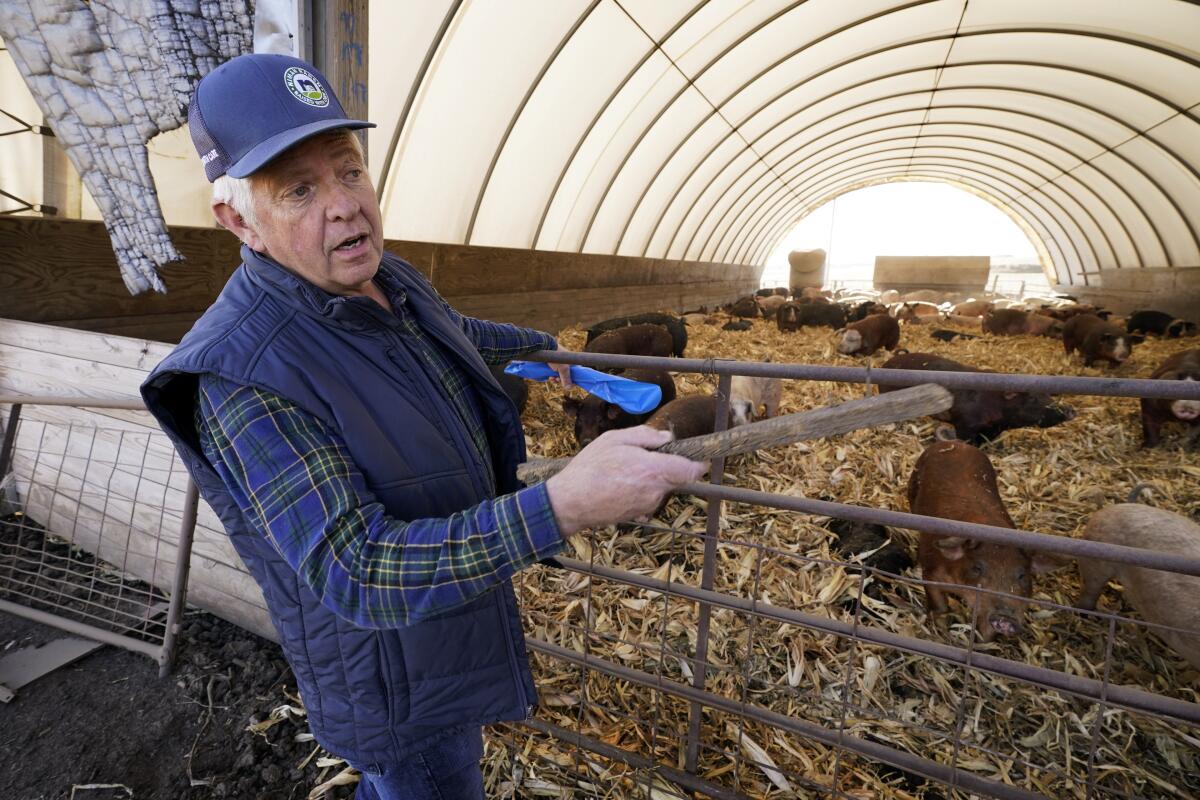
Pride flags were all over Big Grove Brewery, site of Niman Ranch’s opening reception. Dozens of happy people mingled while I sat by myself at a corner table.
Soon, Ron Mardesen, a fifth-generation farmer and Niman Ranch long-timer, joined me. He welcomed me to Iowa, subtly correcting my mispronunciations of Des Moines and Niman by saying them right himself — it’s “Duh-moyn,” not “Dee-moin,” and “Nye-man,” not “Nee-man.”
My bad.
The following day, we boarded buses to New Providence, population 247. Three generations of the Brown family waited to take us around their Alderland Farm. Pigs played in the muck; sows rested in shaded bedding. Squealing newborn piglets were passed around to hold for photo ops. Cornfields surrounded us for hundreds of acres.
It all seemed so perfect. Too perfect. Then someone asked about Proposition 12.
Five years ago, California voted yes on Proposition 12, which institutes standards to make the state’s pork production more humane. Today, L.A. pitmasters are paying the price.
The California ballot initiative, which voters overwhelmingly passed in 2018, requires all pork products sold in the state to come from farms that don’t hold breeding pigs in gestation crates that force them to remain in one position. The new rules, which finally took effect in July, have faced fierce resistance and lawsuits from pork producers arguing that Prop. 12 will ruin farmers and astronomically raise the price of bacon, crispy pata, char siu and all the hog-tastic meals Californians love.
I thought the farmers in our group would go on a rant against crazy, liberal California. It turned out that Niman Ranch had filed an amicus brief last year defending Prop. 12 as the lawsuit seeking to overturn it reached the Supreme Court. (The justices upheld Prop. 12 on a 5-4 vote in May.)
“It’s really no big deal,” a Niman Ranch agent told us. “We just have to go through a third-party inspector. But Niman already has more stringent standards than what California is asking for, anyways.”
This sentiment was repeated by Niman Ranch executives and conference attendees as a point of pride all weekend, with the regularity and fervor of a Santa Monica limousine liberal.
The Niman crowd was overwhelmingly white, so I decided to to see how much they knew about Mexican food. I kicked off my Saturday morning panel by naming some popular Mexican pork preparations and asking anyone who had heard of them to raise their hand.
Who knew what chorizo was? Almost everyone.
Carnitas? Almost everyone.
Chicharrones? Yep.
Al pastor? Who did I think I was talking to?
When I finally stumped them on a dish — asadura, a delicious concoction made from pig’s heart, lung, stomach and blood — someone yelled “I’d try that!” to positive murmurs from the audience.
You’re cool, Hawkeyes — even my own siblings wouldn’t eat asadura.

The stereotype of “Iowa Nice” held true. Middle-aged and elderly farmers came up to me after my panel to say they liked my “style.” I only got one “So you’re from L.A., huh?” the entire weekend, which I answered by saying I’m from Anaheim. When I walked through the Black and Latino part of town to eat at a taco truck, people greeted me with a wave of a hand and a grin, since it was obvious I was an out-of-towner — the only person wearing pants and leather shoes at noon on a sweltering day.
Niman Ranch’s grand finale was a five-course pork dinner, with influences ranging from soul food to Mexican cuisine to Indian cooking and more. I sat with Tony and Bev Kuehn of nearby Ankeny and their two daughters, the elder of whom was receiving a Niman Ranch scholarship that night. Also with us was Leo Landis, state curator for the State Historical Society of Iowa.
I mentioned my surprise at seeing as many Salvadoran restaurants as Mexican ones on the way back from the farm tour. Everyone nodded. Landis said that Central Americans began to move to Iowa 20 years ago for meatpacking jobs.
“If you had asked [the crowd earlier] what a pupusa was,” he said with a kind smile, “I would’ve raised my hand!”
Tony Kuehn, a huge Kobe Bryant fan, listened intently as I described the work the Times did the day Bryant, his daughter Gianna and seven others died in a helicopter crash. The conversation then turned to Brock Purdy, who entered the 2022 NFL season as the last player picked in the draft and finished it leading the San Francisco 49ers to the NFC Championship game. Turned out he had started four years for the Iowa State Cyclones, which explained the 49ers flags I had seen flying outside houses.
“Here in Iowa,” said Sadie Kuehn, the scholarship winner, “Purdy is a legend.”
I had to catch an early flight, so I left before the banquet ended. At the airport, I caught up with Jo Lerma-Lopez, who runs Luna Mexican Kitchen in San Jose and had made the main course: cochinita pibil, Yucatan-style roasted pork. She admitted to worrying whether the crowd would appreciate her dish and was relieved that my table of Iowans loved it and also her freshly made corn tortillas. The only thing that was missing, I said, was the habanero salsa that typically accompanies Yucateco cooking.
“I didn’t know how they would react to so much spice,” Lerma-Lopez said.
I think Iowa would’ve done just fine. I’ll have to find out next time — and there will be a next time.
More to Read
Sign up for Essential California
The most important California stories and recommendations in your inbox every morning.
You may occasionally receive promotional content from the Los Angeles Times.
